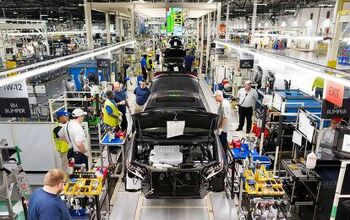Hammer Time: Bankrate.com And The Economics Of Car Ownership
One thousand, nine hundred, and fifty two dollars.
That is how much the average Georgian is supposed to pay in tax, title, and registration fees every year according to Bankrate.com.
When I read that factoid, my eyebrows almost flew off my head. The amount had no cents, and the statement made no sense because I happen to be the guy who collects the taxes from my customers and sends them to the state. Only a $28,000+ car purchase every single year would make this possible, and Georgia is a notoriously poor state. Out of a population of nearly 10 million, our state registered fewer than 300,000 new vehicle sales in 2012.
I quickly concluded that Bankrate.com had done little homework except to launched a PR campaign, under the guise of a study, that was heavy on the numbers and light on the facts.
I also decided to read through the list since 49 other states were also given their daily dose of tax calculations. Immediately, I saw enough red flags to warrant a bit more detail.
New Jersey, my former high tax home with potholes aplenty and the infamous New Jersey Turnpike, supposedly had less than half the taxes of Georgia ($915 vs. $1952).
Really??? What else? Well, the 0% sales tax and emission-free owners in Wyoming apparently paid more in vehicle taxes and fees ($1643) than the People’s Republic of New York ($1146).
The only word that came to my mind when I want down the list of states was, “Fugheddaboudit!” As a car dealer and former auto auction owner who did business with customers in all of these states over the last 10 years, none of these findings made any sense to me. So after about 400 mainstream media outlets, from Fox to CNN, publicized the study without so much as a blink of forethought over the next 24 hours, I decided to go about the process of finding out the truth of the matter.
Little did I know that when it comes to calculating taxes, no government makes it easy.
The first step was contacting a government official who could provide me with a clear compass as to where to go.
Tim Echols, a Commissioner for the Georgia Public Service Commission, turned out to be that guy. Back when I started in the auto auction business as a ringman, two of Tim’s brothers worked with me as auctioneers. Tim grew up selling popcorn and peanuts at his family’s auto auction and when it came time to ask for help, I received guidance from him within minutes.
“A lot of it is public. Google “office of planning and budget” and “georgia.” If it has to do with vehicles, the other route is asking the Dept of Revenue Commissione…. to assist.”
The Google search yielded this site and this report. It just so happened that I began my career as a financial analyst and soon, I had a short list of line items that would make for a first draft of what would become a surprisingly intricate study.
Since New Jersey was my former home with a similar sized population to Georgia, I decided to use that state as a baseline comparison. Gas taxes and government insurance fees were already calculated in the “gas” and “insurance” columns at Bankrate.com. This freed me to focus on the taxes and fees related to buying and keeping the car. Within about 30 minutes, I created a very basic spreadsheet which summarized the sales taxes, tag fees, title transfers, and annual registration costs between the two states.
New JerseyGeorgiaSales and/or Title Tax7%6.5%Registration Renewal$35 to $85$20Emissions$20$20One-Time Tag Fee$0$20One-Time Title Processing Fee$60 to $85$18TollsThe NJ TurnpikeMinimal to NoneThe chance of New Jersey having less than half the tax burden of Georgia when it came to vehicle ownership, was about the same chance of the New York Giants making it to the playoffs this year. Or in auto enthusiast terms, the same chance of Chevy retiring the Corvette nameplate and re-introducing the model as an Aveo.
At this point I had many of the right ingredients for a solid rebuttal, and it was time to gauge interest with a few media outlets.
Marty Padgett, a long-time automotive journalist and Editorial Director at High Gear Media, was interested. So was Justin Hyde, the editor-in-chief of Yahoo! Autos. After a pitch and a couple of brief Facebook conversations, I had the means to invest the time and the further analysis that this type of study would quickly require.
I decided to keep my findings open to all parties, at all times. It was the fair thing to do. I shared my work with heads of government agencies, deputy directors, and special assistants who are constantly immersed in managing the never-ending labyrinth of government data. When a certain statistic was unavailable, such as the average cost of vehicles purchased in the two states, I was either able to eventually find the right contact, or find the right data that would let me generate those numbers.
All of this research was familiar territory for me. When I helped take companies public back in my earlier days as a financial analyst, I had to do the same exact thing in the private sector. Collect data within a company and find the truth of how they were actually using those resources. This takes time and a thorough auditing of your numbers. Once the numbers were confirmed from a variety of sources, I constructed a ‘fail-safe’ simulation for the average vehicle owner. A spreadsheet that reflected the average vehicle age (11.5 years), purchase price ($8500 average in Georgia), and ownership period (6 years in Georgia).
When the numbers were in, the Bankrate.com estimate of $1,952 in annual taxes for the average Georgian turned out to be as far off as Mercury is from Pluto.
The real cost was about $115 a year in Georgia before taking into account gas taxes, state fees for insurance and other minor costs that weren’t part of Bankrate.com’s “tax” calculation. To me all those state collected revenues are nothing more than hidden taxes. A tax is a tax in my world. But to keep this comparison consistent, I used Bankrate.com’s methodology for allocating certain taxes to other categories.
To add value for my audience, I also reported on other hidden costs of ownership that are rarely included in these studies: emission related repairs, toll roads from private companies, road construction and maintenance, and police speed traps that to varying degrees are also part of the hidden cost of car ownership.
My findings were published at Yahoo (click it!) and covered at High Gear Media as well. However, one of the lessons I learned early on in this business is that most media outlets rarely, if ever, correct their findings if the information came directly from a third-party source. The New York Times, CNN, and hundreds of other media outlets have to deal with countless studies that are often done more for shock value than for ethics and integrity. In fact, the later are notable exceptions to the rule.
All it often takes to get a “study” out there, is good PR. Honesty is optional.
So when you read about some sensationalized statistic that is blathered about in the mainstream media, remember the age old words of Mark Twain. “There are lies, damn lies, and statistics.” That is why part of our hard work at The Truth About Cars includes a special on focus on, what I would kindly call, the lies about cars. People lie to us because there is money in doing so. There is an amazing amount of PR fed bullshit to contend with in our business that is never called out as such, and even the most brilliant and gifted writers often find themselves with muck on their shoes and sweet talkers in their ears and email boxes. So, in light of that, if you want to bring some unique facts and experiences to the table, please don’t shy about it. Feel free to contact us.
Oh, and share how much in taxes you paid for your rides during the course of this year. I’m willing to bet that unless you bought a new car, it was nowhere near one thousand, nine hundred and fifty-two dollars…. and zero sense.
More by Steven Lang
Latest Car Reviews
Read moreLatest Product Reviews
Read moreRecent Comments
- MaintenanceCosts I wish more vehicles in our market would be at or under 70" wide. Narrowness makes everything easier in the city.
- El scotto They should be supping with a very, very long spoon.
- El scotto [list=1][*]Please make an EV that's not butt-ugly. Not Jaguar gorgeous but Buick handsome will do.[/*][*] For all the golf cart dudes: A Tesla S in Plaid mode will be the fastest ride you'll ever take.[/*][*]We have actual EV owners posting on here. Just calmly stated facts and real world experience. This always seems to bring out those who would argue math.[/*][/list=1]For some people an EV will never do, too far out in the country, taking trips where an EV will need recharged, etc. If you own a home and can charge overnight an EV makes perfect sense. You're refueling while you're sleeping.My condo association is allowing owners to install chargers. You have to pay all of the owners of the parking spaces the new electric service will cross. Suggested fee is 100$ and the one getting a charger pays all the legal and filing fees. I held out for a bottle of 30 year old single malt.Perhaps high end apartments will feature reserved parking spaces with chargers in the future. Until then non home owners are relying on public charge and one of my neighbors is in IT and he charges at work. It's call a perk.I don't see company owned delivery vehicles that are EV's. The USPS and the smiley boxes should be the 1st to do this. Nor are any of our mega car dealerships doing this and but of course advertising this fact.I think a great many of the EV haters haven't came to the self-actualization that no one really cares what you drive. I can respect and appreciate what you drive but if I was pushed to answer, no I really don't care what you drive. Before everyone goes into umbrage over my last sentence, I still like cars. Especially yours.I have heated tiles in my bathroom and my kitchen. The two places you're most likely to be barefoot. An EV may fall into to the one less thing to mess with for many people.Macallan for those who were wondering.
- EBFlex The way things look in the next 5-10 years no. There are no breakthroughs in battery technology coming, the charging infrastructure is essentially nonexistent, and the price of entry is still way too high.As soon as an EV can meet the bar set by ICE in range, refueling times, and price it will take off.
- Jalop1991 Way to bury the lead. "Toyota to offer two EVs in the states"!



































Comments
Join the conversation
Excellent article. The insurance rates are dead wrong, too. I live in Michigan, our most updated 2013 rate average is $2520, not $921 as the Bankrate article claimed. We have the second highest car insurance rates in the country. Source: http://www.insure.com/car-insurance/car-insurance-rates.html
The $157 in taxes and fees for Oregon is way off since it doesn't account for Oregon's multi-year registration and may be applying plate and title cost annually. So I dd the math myself. The DMV fees page http://www.oregon.gov/ODOT/DMV/pages/fees/vehicle.aspx lists a $172 4 year charge for new cars plus $77 for a title and $24 for standard plates for a total of $273. The worst case scenario is if you live in Multnomah county (Portland) and get hit with the $19 a year county fee plus $21 every 2 years for emissions testing for a grand total of $391 for 4 years or $97.75 a year. For an older car it gets even cheaper, registration renewals are $86 for 2 years plus DEQ where needed. This means that the rock bottom annual registration fee for a car with existing plates is $43 a year since Oregon plates are normally used for the lifetime of the vehicle. That said, Oregon is already rated the cheapest place to own a car due to mid pack insurance and repair costs and not too horrible gas prices.